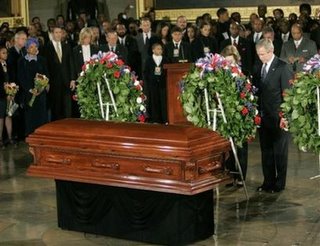
Parks, a former seamstress, became the first woman to lie in honor in the Rotunda, sharing an honor bestowed upon Abraham Lincoln, John F. Kennedy and other national leaders. Bush and congressional leaders paused to lay wreaths by her casket, while members of a university choir greeted her with "The Battle Hymn of the Republic."
Rep. John Conyers (news, bio, voting record), D-Mich., in whose Detroit congressional office Parks worked, said the ceremony and public viewing showed "the legacy of Rosa Parks is more than just a success for the civil rights movement or for African-Americans. It means it's a national honor."
"She was a citizen in the best sense of the word," said Sen. Tom Harkin (news, bio, voting record), D-Iowa. "She caused things to happen in our society that made us a better, more caring, more just society."
Outside the Capitol, as flags flew at half-staff, thousands of people awaited the chance to pay their respects, some arriving before noon. Some carried signs that read, "Thank you, Rosa Parks."
The crowd cheered loudly when the motorcade, led by Parks' hearse and a vintage D.C. Metro bus, arrived. Her casket was carried from the hearse by a military honor guard while Rep. Carolyn Kilpatrick (news, bio, voting record), D-Mich., stood with family members and friends outside the steps leading up to the Capitol and prayed.
Senate chaplain Barry Black, bowing his head in prayer, said Parks' courage "ignited a movement that aroused our national conscience" and served as an example of the "power of fateful, small acts."
Bush, who did not speak during the brief ceremony, issued a proclamation Sunday ordering the U.S. flag to be flown at half-staff over all public buildings on Wednesday, the day of Parks' funeral and burial in Detroit.
The president and first lady Laura Bush were joined by Senate Majority Leader Bill Frist, R-Tenn., Senate Minority Leader Harry Reid, D-Nev., temporary House majority leader Roy Blunt, R-Mo., and other members of Congress.
Fred Allen, 59, who grew up in segregated Halls, Tenn., brought his 20-year-old son to help him understand the civil rights era.
"He has no idea what it was like to grow up in the South, where you had to hold your head down," Allen said.
Robert Cunningham, 65, caught a flight from Atlanta with his wife, daughter and four grandchildren so they could pay their last respects. When they learned Friday night that Parks' body would lie in honor in the Capitol, Cunningham's wife said, "We have to go."
"She started the movement," Cunningham said of Parks, staring at the West facade of the Capitol. "She was the mother of the civil rights movement by simply saying, 'I'm tired of giving up my seat.'"
Parks, who died last Monday, was arrested in 1955 for refusing to give up her bus seat to a white man. Among those who supported her was Dr. Martin Luther King Jr., who led the 381-day boycott of the Montgomery, Ala., bus system that helped initiate the modern civil rights movement.
At St. Paul A.M.E. Church in Montgomery on Sunday, where Parks had been lying in honor at the church since Saturday, an overflow crowd including Secretary of State
Condoleezza Rice celebrated her life.
"I was here when Rosa Parks started and I just wanted to be here when she departed," said the Rev. Joseph Lowery, who co-founded the Southern Christian Leadership Conference with the Rev. Martin Luther King Jr.
Rice said she and others who grew up in Alabama during the height of Parks' activism might not have realized her impact on their lives, "but I can honestly say that without Mrs. Parks, I probably would not be standing here today as secretary of state."
Alabama Gov. Bob Riley credited Parks with inspiring protests against social injustice around the world.
"I firmly believe God puts different people in different parts of history so great things can happen," Riley said. "I think Rosa Parks is one of those people."
Lowery and the Rev. Jesse Jackson said the best way for blacks to carry on Parks' legacy would be to push Congress to renew the 1965 Voting Rights Act, which they said would be in jeopardy when it comes up for review in 2007.
The Rev. Al Sharpton, who was a year old at the time of Parks' arrest, said when he arrived in Montgomery for the memorial, he thought about "how if she had just moved her seat, how history might of changed."
Sharpton, a New York City activist, said national leaders such as Rice and former Secretary of State
Colin Powell would have never reached their posts without Parks' symbolic act. Rice would be struggling in a racially charged Birmingham and "Colin Powell would be sitting in a segregated Army barracks," Sharpton preached to the cheering audience.
Johnnie Carr, a 94-year-old veteran of the bus boycott, said Parks was her childhood friend, a woman who "gave every ounce of her devotion" to fighting racial inequality.
"We have accomplished a lot, we've come a long way, but believe me, we have a long way to go," Carr said.














